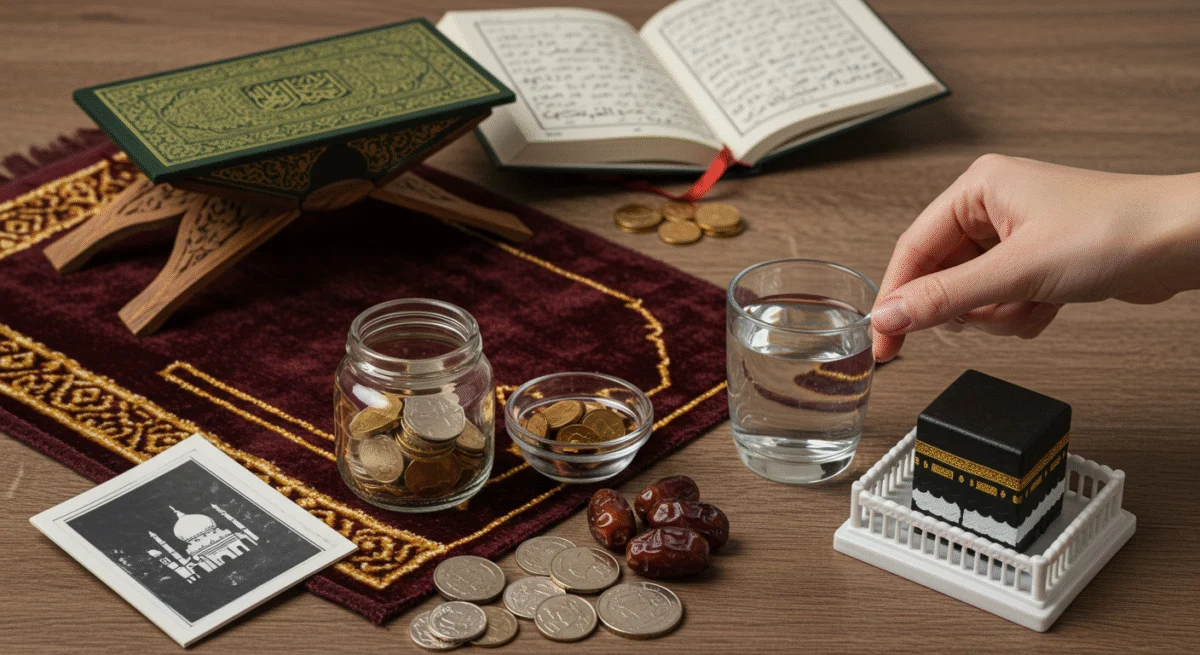
At the heart of Islam lies a beautiful balance between faith and action — between belief in the unseen and practicing that belief in daily life. Islam is not just a religion of ideas; it is a living, breathing way of life.
To help every Muslim remain connected to their Creator and community, Islam is built on five essential acts of worship known as the Five Pillars of Islam. These pillars form the spiritual framework of a Muslim’s life — shaping character, building discipline, and creating unity across the globe.
✋ What Are the Five Pillars?
Each pillar is a divine command with deep personal and communal significance. Let’s explore them one by one:
🕊️ 1. Shahada – The Declaration of Faith
“Ashhadu an la ilaha illa Allah, wa ashhadu anna Muhammadur rasul Allah.”
“I bear witness that there is no god but Allah, and Muhammad is the Messenger of Allah.”
The Shahada is the gateway to Islam — a simple yet profound testimony that brings a person into the fold of the faith. It expresses two key beliefs:
- Tawheed: That there is only one God, Allah, worthy of worship.
- Prophethood: That Muhammad ﷺ is the final messenger sent with truth.
Reciting the Shahada with sincerity marks the beginning of a Muslim’s journey.
🙏 2. Salah – The Five Daily Prayers
Prayer (Salah) is the spiritual heartbeat of a Muslim’s day. It is performed five times daily at fixed intervals:
- Fajr – Before sunrise
- Dhuhr – After midday
- Asr – Mid-afternoon
- Maghrib – Just after sunset
- Isha – At night
Each prayer involves physical movements (standing, bowing, prostrating) paired with recitation from the Quran. Prayer is a direct conversation with Allah — no intermediaries needed.
“Indeed, prayer prevents immorality and wrongdoing, and the remembrance of Allah is greater.” (Quran 29:45)
Prayers are performed facing the Kaaba in Makkah, symbolizing global unity among Muslims.
💰 3. Zakat – Purification Through Charity
Zakat is a yearly obligatory charity on surplus wealth (usually 2.5%). It is not a tax or donation — it is a spiritual purification of one’s wealth and heart.
It supports:
- The poor and needy
- Debtors and those in hardship
- Community projects (education, relief)
Zakat reminds Muslims that wealth is a trust from Allah, not a personal possession.
It fosters social justice, economic balance, and compassion in society.
🌙 4. Sawm – Fasting During Ramadan
Every year, Muslims fast from dawn to sunset for the entire month of Ramadan — abstaining from food, drink, intimate relations, and sinful behavior.
Fasting develops:
- Self-discipline
- Patience and empathy for the less fortunate
- A deepened spiritual focus
“O you who believe, fasting has been prescribed for you as it was prescribed for those before you, so that you may attain taqwa (God-consciousness).” (Quran 2:183)
Ramadan also includes special prayers (Taraweeh), Quran recitation, and acts of generosity.
🕋 5. Hajj – The Pilgrimage to Makkah
Hajj is the sacred pilgrimage to the holy city of Makkah, required once in a lifetime for all financially and physically able Muslims. It occurs during the Islamic month of Dhul-Hijjah.
Millions gather to:
- Walk between the hills of Safa and Marwah
- Stand in prayer at Arafat
- Circle the Kaaba in Tawaf
- Remember the legacy of Prophet Ibrahim and his family
Hajj is the ultimate symbol of equality — Muslims of all races and nationalities dress the same, worship side by side, and humble themselves before Allah.
🧠 The Deeper Wisdom Behind the Pillars
Each pillar trains a different part of the human being:
| Pillar | Trains… |
|---|---|
| Shahada | Faith and belief |
| Salah | Discipline and reflection |
| Zakat | Generosity and empathy |
| Sawm | Patience and restraint |
| Hajj | Unity and submission |
Together, they purify the soul, align the body and mind, and build a just and compassionate society.
🧑🤝🧑 A Global Unity in Action
The Five Pillars are not bound by geography or culture. Whether in a rural village in Indonesia or a busy city in Europe, Muslims all over the world:
- Wake for Fajr
- Break fast at Maghrib
- Pray in the same direction
- Fast in the same month
- Visit the same sacred sites
Islam’s unity is lived daily — not just believed.
🌟 Conclusion
The Five Pillars of Islam are not rituals without meaning — they are daily acts of devotion that bring the believer closer to their Creator, their community, and their own higher purpose.
They remind Muslims to live intentionally, worship sincerely, and contribute to the betterment of the world.
Faith without action is incomplete — and action without faith is empty.
In Islam, the Five Pillars keep both in balance.